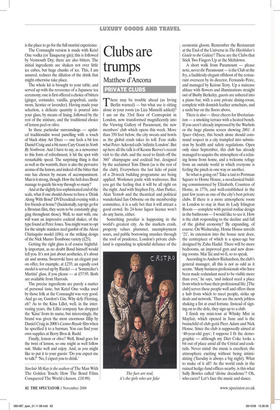Clubs are trumps
Matthew d’Ancona
PRIVATE CLUBS
There may be trouble ahead (as Irving Berlin warned) — but what use is sitting alone in your room (as Liza Minnelli added)? I am on the 33rd floor of Centrepoint in London, now transformed magnificently into the Viewing Gallery of Paramount, the new members’ club which opens this week. More than 350 feet below, the city sweats and howls as the global crash takes its toll. Fear stalks what Peter Ackroyd calls ‘infinite London’. But up here all the talk is of Keanu Reeves’s recent visit to the club, and the need to finish off the 360˚ champagne and cocktail bar, designed by the acclaimed Tom Dixon (as is the rest of the club). Everywhere the last licks of paint of a 28-week building programme are being applied. Workmen jostle with waitresses. But you get the feeling that it will be all right on the night. And with Stephen Fry, Alan Parker, Alan Yentob and the theatrical and political wunderkind Ian Osborne on the membership committee, it is a safe bet that it will attract a good crowd. Its 24-hour liquor licence won’t do any harm, either.
Something peculiar is happening in the world’s greatest city. As the markets crash, property values plummet, unemployment soars, and public borrowing smashes through the roof of prudence, London’s private clubland is expanding in splendid defiance of the economic gloom. Remember the Restaurant at the End of the Universe in The Hitchhiker’s Guide to the Galaxy? These are the Clubs that Stick Two Fingers Up at the Meltdown.
A short walk from Paramount — please note, never the Paramount — is the Club at the Ivy, a faultlessly elegant offshoot of the restaurant overseen by its director, Fernando Peire, and managed by Keiran Terry. Up a staircase ablaze with flowers and illuminations straight out of Busby Berkeley, guests are ushered into a piano bar, with a cosy private dining-room, complete with donnish leather armchairs, and a sushi bar on the floors above.
There is also — three cheers for libertarianism — a smoking terrace with a heated bench. If you aren’t already impressed by the Warhols or the huge plasma screen showing 2001: A Space Odyssey, this bench alone should command respect in a city trampled into submission by health and safety regulations. Open only since September, this club has already managed to acquire the atmosphere of a relaxing home from home, and a welcome refuge from an outside world in which everyone is feeling the pinch in one way or another.
So what is going on? Take a taxi to Portman Square to Home House, a neoclassical building commissioned by Elizabeth, Countess of Home, in 1776, and well-established in the past few years as one of the city’s best private clubs. If there is a more atmospheric room in London to stay in than its Lady Islington Room — complete with period zodiac design in the bathroom — I would like to see it. How is the club responding to the decline and fall of the global economy? By expanding, of course. On Wednesday, Home House unveils ‘21’, its extension into the house next door, the centrepiece of which is a space-age bar designed by Zaha Hadid. There will be more bedrooms, an improved gym and new drawing rooms. Mai Tai and wi-fi, so to speak.
According to Andrew Richardson, the club’s general manager, all this is not as odd as it seems. ‘Many business professionals who have been made redundant need to be visible more than ever,’ he says, ‘and indeed need a place from which to base their professional life. [The club] serves these people well and offers them a hub from which to meet people, strike up deals and network.’ Thus are the newly jobless shaking a fist at cruel fortune. Instead of signing on to the dole, they sign up to a club.
I finish my mini-tour at Whisky Mist in Mayfair, which opened in June and is the brainchild of club genii Piers Adam and Nick House. Since the club is supposedly aimed at ‘40-year-old guys’, I suppose I fit the demographic — although my Diet Coke looks a bit out of place amid all the Cristal and cocktails. Never mind: the music is excellent, the atmosphere exciting without being intimidating (Tuesday is always a big night). What to make of it all? As the world ends in the ruined hedge-fund offices nearby, is this what Sally Bowles called ‘divine decadence’? Oh, who cares? Let’s face the music and dance.


































































































 Previous page
Previous page